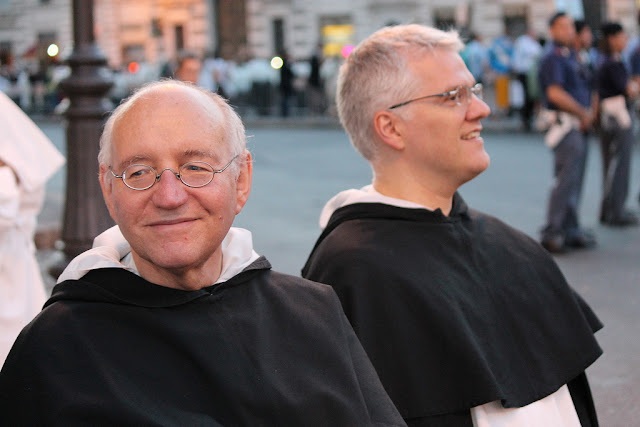Fr. Philip Neri Powell, OP
St. Dominic Church, NOLA
John's disciples find Jesus and ask him, “Why do we and the Pharisees fast much, but your disciples do not fast?” Good question. I wonder why they want to know. Are John's disciples looking for a teacher who's not dragging his students through the desert and serving them nothing to locusts and honey? Or maybe they're disguising a spirit of prideful competition with a question about discipline? Team John is more disciplined than Team Jesus, so tell: why are your players so spiritually lazy, Jesus? Or maybe, and probably, they simply want to know more about Jesus' understanding of how and why we fast. Whatever their motivations for asking the question, Jesus does what he always does when asked to explain himself. He doesn't. Instead, he takes the question as an opportunity to push the questioner further along and under and shows him what lies at the bottom of his query. What lies at the bottom of this question about fasting? From Jesus' response, we can see that there is a connection btw fasting and mourning, a link of btw feasting and living. There is no need for the wedding guests to fast while the groom is still with them. We feast while he's with us, and we fast after he's gone.
If it is true that we feast while Christ is with us, and we fast after he's gone, then what do we do if he is both with us and not with us? The Church has thrived for centuries w/o Christ walking and talking among us. We live in the days after his death, resurrection, and ascension. So, we fast in mourning. However, b/c Christ sent us the Holy Spirit and established his Church, we know that he is always with us, whenever and wherever two or more are gathered in his Name. So, we feast in celebration. Being faithful citizens of New Orleans, we understand all-too-well the connection btw living and feasting. We do both quite well! What better way to give God thanks for His generous gift of human life than to tuck into some jambalaya, biscuits, and bread pudding? But what is the link btw fasting and mourning? One of the most memorable culinary events in the life of a family occurs at a funeral. We eat at funerals as if carbs and sugar will dry up our tears and bring the dead back to life. The line that Jesus draws btw the fast and the funeral seems a bit twisted if not downright knotted up. It helps to remember that both fasting and mourning brings to mind all that is missing.
Bringing to mind all that is missing for Christians is about more than mere remembering. Memorials are common markers for noting people and events. We memorialize war heroes, literary giants, athletes. Photo albums, keepsakes, tombstones bring to mind both the living and the dead. For the disciples of Christ, fasting brings to mind both Christ's presence and his absence; both his life and his death. When we fast, we recognize—thing about again—our dependence on God, our adoption as His children through Christ. And we remember—become members again—of his Body, the Church. When we fast from food, we fast for a memory and that memory is made present, made real. When we fast from whatever it is we are fasting from, we fast for a reason, a purpose and that reason is to mourn, to lament the absence of all that is missing. Christ is not with us, so we fast. Yet, he is always with us, so we feast. We cycle through the year fasting and feasting, remembering and recognizing that he is gone, he is here, and he will be among us again. At the bottom of the question about fasting lies humility—our absolute dependence on God. Without Him, there would be no feasting at all.
Follow HancAquam and visit the Kindle Wish List and the Books & Things Wish List
Click on St. Martin and donate to the Dominicans! ----->





